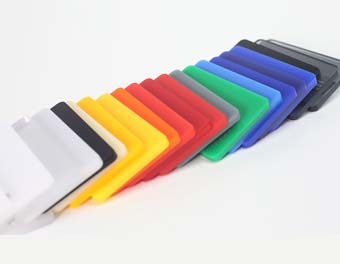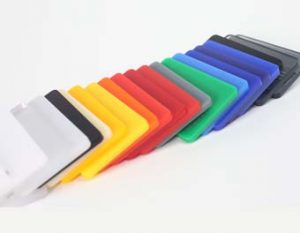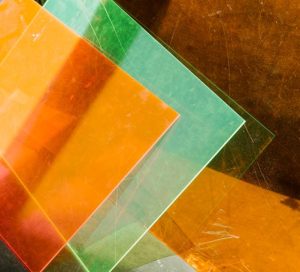Acrylic, also known as Perspex or plexiglass, is a versatile material widely used across industries for its durability, clarity, and flexibility. From signage and furniture to industrial applications, acrylic offers a range of options to suit diverse needs. With so many acrylic types, how do you choose one for your project?
At Denny Plastics, we specialise in providing high-quality acrylic products tailored to your specifications. In this guide, we’ll explore the different types of acrylic, their characteristics, and common applications to help you make an informed decision.
1. Cast acrylic
Pouring liquid acrylic into moulds and allowing it to cure produces cast acrylic. This method creates a highly durable material with excellent optical clarity and a uniform finish.
Key features:
- Exceptional optical clarity.
- The material exhibits a strong ability to withstand cracking and crazing under pressure.
- Easy to cut, shape, and polish.
- It is accessible in an extensive variety of hues and textures.
Applications:
Cast acrylic is an excellent choice for high-end projects that prioritise aesthetics. Premium signage, display cases, and decorative furniture commonly use it. Its durability also makes it suitable for outdoor applications such as architectural glazing.
2. Extruded acrylic
Continuous extrusion manufactures extruded acrylic, making it more cost-effective than cast acrylic. It has consistent thickness and is easier to fabricate, although it’s slightly less durable than cast acrylic.
Key features:
- Economical option for budget-conscious projects.
- Consistent thickness for precise applications.
- Compared to cast acrylic, it is simpler to cut and laser engrave.
- The material is slightly more vulnerable to scratches and stress fractures.
Applications:
Large-scale projects where cost efficiency is crucial, like point-of-sale displays, protective screens, and DIY home improvements, frequently use extruded acrylic.
3. Transparent acrylic
Transparent acrylic, as the name suggests, mimics the clarity of glass but with the added benefit of being lighter and more impact-resistant.
Key features:
- Up to 93% light transmission achieves the glass-like clarity.
- It is shatter-resistant and safer to use than glass.
- UV-stable options are available for outdoor use.
Applications:
Transparent acrylic is ideal for windows, skylights, aquariums, and display cases. It’s also a popular choice for protective barriers in retail and healthcare settings.
4. Frosted acrylic
Frosted acrylic provides a diffused, matte finish that offers privacy while still allowing light to pass through.
Key features:
- Aesthetically pleasing matte surface.
- Resistant to fingerprints and smudges.
- Available in a variety of colours.
Applications:
Office partitions, decorative panels, and light fixtures frequently use frosted acrylic. Its unique finish makes it a stylish option for modern interiors.
5. Coloured acrylic
Coloured acrylic comes in a wide range of shades and finishes, from vibrant solids to subtle tints. It’s a fantastic way to add personality and creativity to your projects.
Key features:
- There is a vast array of colours available, including personalised hues.
- Both opaque and translucent options are available.
- It retains the same durability and ease of fabrication as other types of acrylic.
Applications:
Retail displays, signage, art installations, and branding projects commonly use coloured acrylic. Its versatility allows for creative freedom in design.
6. UV-resistant acrylic
Specially formulated UV-resistant acrylic can withstand prolonged exposure to sunlight without yellowing or degrading.
Key features:
- Superior resistance to UV rays.
- It sustains its optical clarity and colour throughout time.
- This product is suitable for both indoor and outdoor use.
Applications:
This type of acrylic is perfect for outdoor signage, window glazing, and greenhouse panels. Marine applications also use it because of its durability and weather resistance.
7. Anti-reflective acrylic
Anti-reflective acrylic reduces glare and enhances visibility, making it an excellent choice for display applications.
Key features:
- Minimises glare for better visibility.
- Even in brightly lit environments, it maintains clarity.
- Easy to clean and maintain.
Applications:
Museum displays, artwork framing, and retail showcases frequently use anti-reflective acrylic when clear visibility is crucial.
8. Impact-modified acrylic
Impact-modified acrylic maintains its lightweight and transparent properties while offering improved impact resistance.
Key features:
- Compared to standard acrylic, it offers enhanced impact resistance.
- Retains clarity and durability.
- Ideal for high-traffic or safety-critical applications.
Applications:
When durability is a top priority, safety screens, protective barriers, and playground equipment frequently use this type of acrylic.
Why choose acrylic for your project?
Acrylic is a highly adaptable material that balances strength, aesthetic appeal, and functionality. Its lightweight nature, ease of fabrication, and affordability make it an attractive choice for a wide range of industries, from construction to retail.
At Denny Plastics, we offer a comprehensive selection of acrylic products to meet your specific requirements. Whether you need bespoke cuts, custom colours, or specialised finishes, our expert team is here to assist you every step of the way.
Conclusion
Understanding the different types of acrylic is key to choosing the right material for your project. Whether you’re looking for cost-effective extruded acrylic or premium cast acrylic, each type has unique properties to suit various applications. If you’re unsure which option is best for your needs, don’t hesitate to contact Denny Plastics. With decades of experience in the acrylic industry, we’re proud to provide tailored solutions and exceptional service to help bring your ideas to life. Get in touch with us today to learn more!










